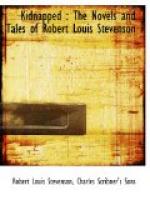At last, when my landlord could drink no more, he showed me to a bed, and I lay down in very good spirits; having travelled the greater part of that big and crooked Island of Mull, from Earraid to Torosay, fifty miles as the crow flies, and (with my wanderings) much nearer a hundred, in four days and with little fatigue. Indeed I was by far in better heart and health of body at the end of that long tramp than I had been at the beginning.
CHAPTER XVI
THE LAD WITH THE SILVER BUTTON: ACROSS MORVEN
There is a regular ferry from Torosay to Kinlochaline on the mainland. Both shores of the Sound are in the country of the strong clan of the Macleans, and the people that passed the ferry with me were almost all of that clan. The skipper of the boat, on the other hand, was called Neil Roy Macrob; and since Macrob was one of the names of Alan’s clansmen, and Alan himself had sent me to that ferry, I was eager to come to private speech of Neil Roy.
In the crowded boat this was of course impossible, and the passage was a very slow affair. There was no wind, and as the boat was wretchedly equipped, we could pull but two oars on one side, and one on the other. The men gave way, however, with a good will, the passengers taking spells to help them, and the whole company giving the time in Gaelic boat-songs. And what with the songs, and the sea-air, and the good-nature and spirit of all concerned, and the bright weather, the passage was a pretty thing to have seen.
But there was one melancholy part. In the mouth of Loch Aline we found a great sea-going ship at anchor; and this I supposed at first to be one of the King’s cruisers which were kept along that coast, both summer and winter, to prevent communication with the French. As we got a little nearer, it became plain she was a ship of merchandise; and what still more puzzled me, not only her decks, but the sea-beach also, were quite black with people, and skiffs were continually plying to and fro between them. Yet nearer, and there began to come to our ears a great sound of mourning, the people on board and those on the shore crying and lamenting one to another so as to pierce the heart.
Then I understood this was an emigrant ship bound for the American colonies.
We put the ferry-boat alongside, and the exiles leaned over the bulwarks, weeping and reaching out their hands to my fellow-passengers, among whom they counted some near friends. How long this might have gone on I do not know, for they seemed to have no sense of time: but at last the captain of the ship, who seemed near beside himself (and no great wonder) in the midst of this crying and confusion, came to the side and begged us to depart.
Thereupon Neil sheered off; and the chief singer in our boat struck into a melancholy air, which was presently taken up both by the emigrants and their friends upon the beach, so that it sounded from all sides like a lament for the dying. I saw the tears run down the cheeks of the men and women in the boat, even as they bent at the oars; and the circumstances and the music of the song (which is one called “Lochaber no more”) were highly affecting even to myself.




